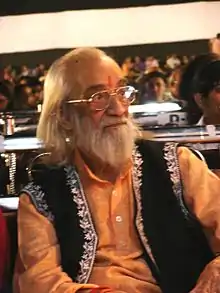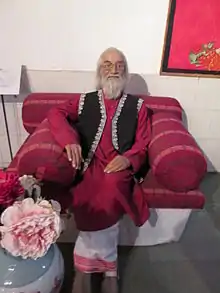Balwant Moreshwar Purandare
Balwant Moreshwar Purandare (born 29 July 1922), popularly known as Babasaheb Purandare is a writer and theatre personality from Maharashtra, India. He was awarded with Padma Vibhushan, India's second-highest civilian award on 25 January 2019. His works are mostly based on the events related to the life of Chatrapati Shivaji Maharaj, the 17th-century founder of the Maratha Empire; as a result he is termed as Shiv-Shahir[2] ("Shivaji's bard"). He is mostly known for his popular play on Shivaji Jaanta Raja which was popular not only in Maharashtra but also in Andhra Pradesh and Goa. Purandare has also studied the history of the Peshwas of Pune. He is also known for his significant contribution along with Madhav Deshpande & Madhav Mehere as senior party leaders in the early-1970s of Shiv Sena along with Balasaheb Thackeray. In 2015, he was awarded with Maharashtra Bhushan Award, Maharashtra's highest civilian award.[3]
Balwant Moreshwar Purandare | |
|---|---|
 Babasaheb Purandare | |
| Born | Balwant Moreshwar Purandare 29 July 1922 |
| Nationality | Indian |
| Occupation | writer, fictional novelist |
| Children | 3 |
| Parent(s) | Moreshwar Purandare |
| Awards | Padma Vibhushan (2019) Maharashtra Bhushan (2015) |
Works

Purandare had started writing stories related to the period of Shivaji's reign at a very young age, which were later compiled and published in a book titled "Thinagya" ("Sparks"). His other works include books titled Raja Shiva-Chatrapati and Kesari, and a book on life of Narayanrao Peshwa. But the most well-known of his works is the drama, Jaanata Raja, a widely popular play on Shivaji published and first staged in 1985. Since then the drama has been staged over 1000 times in 16 districts of Maharashtra, Agra, Delhi, Bhopal, and the United States. Originally written in Marathi, this work was later translated into Hindi.[1][4] This drama is performed by over 200 artists, as well as elephants, camels and horses. Generally the performance of this drama begins around Diwali each year.
For his works, in the field of drama, he was awarded the Kalidas Samman by the Madhya Pradesh government for the year 2007–08.[1]
Personal life
His wife Nirmala Purandare (1933–2019) was a veteran social activist. She founded Vanasthali organisation in Pune.[5] Her work for rural women, child development was renowned. Her brother, Shree Ga Majgaonkar, and Babasaheb Purandare had very close association in the field of literature. Babasaheb Purandare has a daughter (Madhuri) and two sons, Amrut and Prasad. All his children are active in Marathi literary field. [6] Madhuri Purandare, his daughter, is a renowned writer, painter, and singer.[7]
Criticism
Maratha outfit that has been protesting against Purandare believes that he has sullied the reputation of Maratha warrior Shivaji through his writings. They also, protested when Maharashtra government decided to award Maharashtra Bhushan to the writer.[8]
In popular culture
- A 2008 TV show Raja Shivchatrapati depicting the life of Maratha king Shivaji was based on Raja Shivchatrapati novel of Babasaheb Purandare.
References
- "Kalidas Samman to Shri Purandare". Department of Public Relations, Madhya Pradesh Government. 20 November 2007. Archived from the original on 16 July 2011. Retrieved 16 December 2011.
- Śālinī Pāṭīla (1987). Maharani Tarabai of Kolhapur, c. 1675-1761 A.D. S. Chand & Co. ISBN 978-81-219-0269-4. Retrieved 9 August 2013.
- "Purandare awarded "Maharashtra Bhushan"". Indian Express. 1 May 2015. Retrieved 1 May 2015.
- "Janta Raja' to be staged in the US: Baba Purandare". 2 November 2007. Retrieved 16 December 2011.
- "Social activist, educationist Nirmala Purandare dies in Pune". The New Indian Express. 21 July 2019.
- https://www.hindustantimes.com/pune-news/noted-social-activist-educationist-nirmala-purandare-dies-in-pune/story-RXHsZAPJ6w5ija3lTfGBRI.html
- https://jyotsnaprakashan.com/illustrators/english-illustrators/madhuri-purandare-2
- Kumar, Krishna (20 August 2015). "Writer Babasaheb Purandare receives 'Maharashtra Bhushan' despite protests". The Economic Times. Retrieved 1 June 2018.